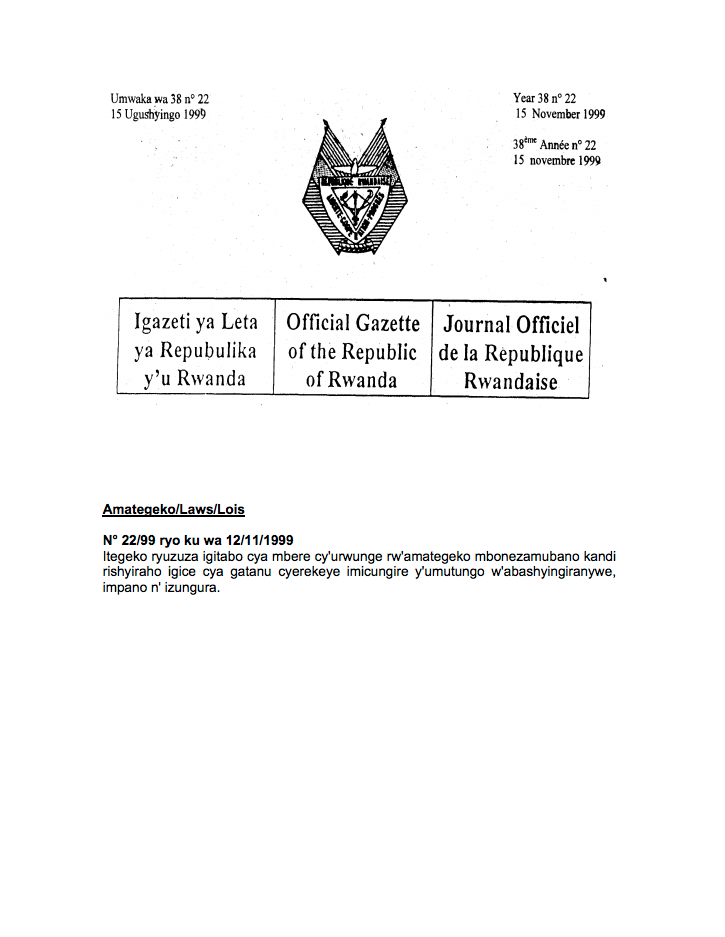The LAND Project is a five year program supported by the United States Agency for International Development (USAID). Its primary goal is strengthening the resilience of Rwandan citizens, communities and institutions and their ability to adapt to land-related economic, environmental and social changes.
Resilience is defined as “the ability to withstand or recover from difficult conditions.” It also comprises the ability of human and ecological systems to recover from shocks or difficult changes, and to transform to a better condition by responding flexibly and creatively to stress factors. In Rwanda, land tends to be one of the primary assets citizens rely on to buffer against difficult conditions and rapid change.
The project’s central objectives are twofold:
1.Increased capacity of local Rwandan institutions to generate high quality, evidence-based research on land-related issues that can be used by the Government, civil society organizations, and Rwandan citizens.
2. Increased understanding of land laws, policies, regulations, and legal judgments on land-related issues by GOR officials, local civil society organizations, research institutes and citizens.
Key outcomes of the project include:
- Holding annual National Land Research Agenda workshops to establish the research priorities of land sector stakeholders that the LAND Project will support. These workshops bring together multiple stakeholders from government, civil society and the research community;
- Supporting research on land-related issues through competitive awards to Rwandan research institutions, universities, and civil society organizations, and providing tailored capacity building assistance to improve research and advocacy capabilities;
- Offering training and other support to legal assistance providers to enhance their capacity to support women and vulnerable populations in understanding and realizing their land rights;
- Training local land authorities on the implementation of the land law and regulations.
- Carrying out research on critical land issues, including gendered land rights in practice, community rights to resources in and around protected areas, and expropriation.
- Managing a land-focused website to improve research, communications, and policy advocacy efforts that are focused on land, and to act as a vehicle for enhancing collaboration between actors working in the land sector;
- Providing organizational development support to civil society organizations supporting women’s land rights.
- Supporting innovative and coordinated communications approaches by civil society and government that enhance the knowledge of Rwandan citizens about research findings and their land rights.
Because the LAND Project is a five year endeavor, we are seeking an institution that has the interest, capacity, skills and resources to eventually take over hosting and maintenance of the website, ensuring it stays up-to-date and relevant to the land sector stakeholder community. If your organization is potentially interested in assuming management of this site, please contact us and tell us why you believe your institution would be an ideal candidate.
Members:
Resources
Displaying 136 - 140 of 149Emergency and Development: the Case of Imidugudu, Villagisation in Rwanda
To accommodate the needs of hundreds of thousands of returnees after war and fgenocide in 1994, the new Rwandan Government launched a settlement programme, Imidugudu. Since early 1997, this programme has targeted the entire rural population: all scattered households in the country had to be regrouped in villages. What started as a response to an emergency turned into an ambitious but controversial development programme. The programme has been implemented with support from international organizations, including UNHCR and numerous NGOs.
Law N° 22/99 of 12/11/1999 to Supplement Book I of the Civil Code and to Institute Part Five Regarding Matrimonial Regimes, Liberalities and Successions.
Law N° 22/99 of 12/11/1999 to Supplement Book I of the Civil Code and to Institute Part Five Regarding Matrimonial Regimes, Liberalities and Successions.
Published on the 15 November 1999
Report on the Workshop on Land Use and Villagisation in Rwanda
This paper summarizes the backround, presentations, and outcomes of a workshop organized by Rwanda Initiative for Sustainable Development in partnership with Oxfam Great Britain on land use and villagisation in Rwanda.
The Urgency of Land and Agrarian Reform in Rwanda
The challenges which lie ahead for post-genocide Rwanda's economic, social and political development are closely related through the issue of land. The pressure from a high rate of population growth, added to the paucity of economic opportunities outside the agricultural sector, is forcing people off the land and into poverty. Society is under extreme stress. Over the last decade the fabric of Rwandan society has been torn, resulting in ethnic and social divisions which culminpted in the events of 1994. Since then, new groups have entered the competition for land.
Women’s Property Rights and The Land Question in Rwanda
Looks at property rights and returnees, the situation of women in relation to property rights, consequences of women’s lack of access to land, initiatives taken by national authorities to improve women’s property rights, and initiatives taken by UNHCR.




